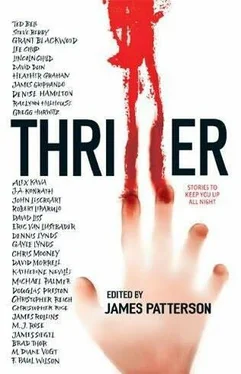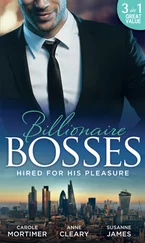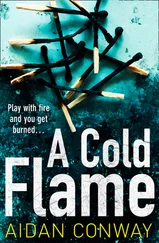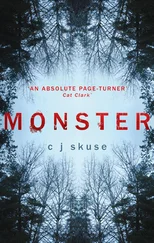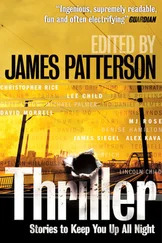Then the officer of the guard saw them out there all alone and going in the odd direction, saw that one man was holding up the other. He ran after them, shouting, "You out there! You, Major! Stop where you are! Stop-"
Hareet dropped the dead guard, drew his pistol and shot the running officer of the guard. Then he turned and ran on across the courtyard toward the small barred side gate where he knew there was only one guard.
Pandemonium flowed through the building and the courtyard as the guards and officers all grabbed for their weapons. Quickly the day-shift and night-shift guards all spotted Hareet and began to converge on him. The guard at the side gate fired and missed. Hareet shot the guard down.
He leaped for the wall. A bullet hit him in the leg, buckled it. He collapsed, rolled, and struggled up again. He grasped the bars of the gate and hauled himself up toward the top of the wall. Outside the wall, the two armored cars on patrol both careened into the street. Hareet reached the top of the wall.
A burst of fire struck him in the back. The machine guns on the armored cars cut him in two. Two rifle bullets exploded in his head. His body, at the very top of the wall, fell back to the stones of the courtyard.
The night-shift and day-shift guards stood all around Captain Hareet's body, uncertain what to do, perhaps awed by the daring escape that had failed.
A colonel of military police pushed through the guards and shot Hareet in the head again.
The colonel bent down, searched, and found the microfilm in Hareet's breast pocket. The colonel laughed and kicked the dead body. Some soldiers laughed now, spat on Hareet's lifeless eyes.
"Cut his head off," the colonel of military police ordered. "Hang it on the gate with a sign: Pig of a Spy!"
A general of the staff walked slowly up, and the soldiers and other officers gave way. The general looked down at Hareet's body. The colonel of military police handed the general the roll of microfilm.
"Take his body and identify it, Colonel, before you cut off any heads," the general said. "A very stupid attempt, but well done. He very nearly escaped."
"A desperate attempt," the colonel sneered. "A hopeless attempt. They are afraid of us, General."
"Of course they are afraid of us, as we are afraid of them," the general said almost wearily. "Find out what it was they wanted,
Colonel, what he has on that microfilm. Not that it matters now, but they might try again."
"They will always fail," the colonel insisted. He did not like to be told he was afraid of the enemy. That was weak, defeatist talk. He would watch the general. But now he looked down again at the dead body. "The fool never knew it would have done him no good to succeed. We would locate what he took even if he had escaped, and instantly change our plans."
The colonel laughed. Hareet's body was taken away. The chief of supply quickly identified the enormity of the theft and posted a twenty-four-hour guard at his door. Even though, he explained to the army commander, there was no way anyone could get that data without the chief of supply knowing it instantly and changing it. In any event, the chief of supply assured the army commander, the data was still secret and safe, there was no need to change the vital plans with so little time left. The army commander was relieved, such a change could have delayed them for days.
Captain Hareet was soon identified, and his head cut off and hung on the gates for the fellahin to jeer at.
The headquarters returned to its routine. Officers came and went in a steady stream. The fellahin servants cleaned the courtyard while the officers prepared for war. The hardworking, important and excited officers ignored the ragged peasants. One of the fellahin swept up a large piece of discarded halvah. He dropped the halvah into his trash sack. Eventually he took the sack to a trash box near the small barred gate in the side wall where Hareet had died.
Soon, a truck picked up the trash boxes and drove them to the city waste dump. Out at the dump, a ragged peddler scraped among the boxes. Later, the same peddler hawked wares in front of a hotel near the eastern edge of the city.
A pretty Italian tourist woman bought a small urn from the peddler.
That evening, the pretty Italian tourist checked out of her small hotel and drove from the city to a deserted beach. On the beach, she stripped down and swam out to sea.
Thirty-six hours later, the attack was launched. Ten hours after that, the war was essentially over. All the supply depots, ammunition dumps and fuel centers of the attacking army were destroyed within ten hours of the initial attack.
Some weeks later, Lieutenant Greta Frank sat alone on a hill in the north of her country and looked out toward the border beyond the orange trees and olive groves. The border was quiet. It was not yet safe, but it was becoming safer.
Greta cried.
The minister came up the hill and squatted down in the dry dust. His hard gray eyes looked out toward the border.
"There was no other way," the minister said. "They had to be convinced that he had tried and failed. They had to catch him- and not alive. He knew it was the only plan that would work."
"And you knew," Greta said.
"I knew."
"You knew before we went."
The minister drew patterns in the dust with his walking stick. "Why didn't you go there and do it yourself?" Greta asked. "The great minister who won the war." "I could not have done it."
"No, you could not have done it, and I could not have done it, and the peddler, whoever he really is, could not have done it. Only Paul could have done it," Greta said. She studied the patterns drawn in the dust by the minister. Ancient patterns like the sun and moon of cavemen, hieroglyphics. "He knew he was the only way."
Below, among the orange trees, two young boys ran and shouted, played soldier.
John Lescroart & M. J. Rose
John Lescroart is a bestselling writer of legal thrillers. M. J. Rose is an international bestselling writer of thrillers about a sex therapist and her patients. Intersecting those two variations seemed like a difficult challenge, but that's exactly what The Portal does. Via e-mail from one coast to another, Lescroart and Rose explored the psyche and actions of Lucy Delrey, a young, disturbed woman who, at different points displayed facets that surprised both authors. For Rose, Lucy's therapy is the portal itself: a door that opens into a darkened room, which is all Dr. Morgan Snow (from Rose's thriller The Halo Effect) can see. Consequently, the therapist's advice, which Lucy takes to heart and which propels the story forward, is based on elusive shadows. For Les-croart, the story represented an opportunity to revisit the legal world from which he drew his bestselling thriller Guilt. Lucy's trip to exorcize her demons takes her straight to San Francisco (Lescroart's main stomping grounds), where sophisticated professionals eat in fine restaurants, stay in fine hotels and mingle within a society that, for all its surface appeal, hides many a dark secret.
I think there is something wrong with me, emotionally." I nodded. She'd said this before. In almost every session. Lucy Delrey had been in therapy with me for two months. Every Tuesday evening at 6:00 p.m. she arrived at my office on Manhattan's Upper East Side, sat opposite me, and we chipped away at her defenses.
"Why do you feel there's something wrong?" I asked her.
"I just don't feel anything, Dr. Snow. Not even in the most extreme circumstances."
"What are the most extreme circumstances?" The conversation we were having was almost identical to the conversation we'd had last week, and every week before that. We always got to this point when Lucy would shut down, sit silently for a few minutes, and then change the subject and talk about how as a child she'd wanted to be an artist and about the man who had inspired her.
Читать дальше
